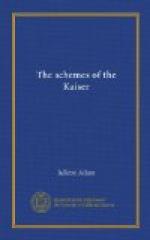May 12, 1891. [8]
There is an attitude frequently adopted by William II, that German socialists are in the habit of describing, as “the whipping after the cake.” He has now had the socialist deputies arrested, and he is introducing throughout the country a system of espionage and intimidation, which is only balanced to a certain extent by his fondness for sending abroad a class of reptiles who go about preaching, writing and imparting to others the doctrines which he endeavours to strangle at birth in his own country. In spite of his brief flirtation with socialism (in which he indulged merely to copy the man whom he opposes in everything and cordially detests), William II has now come to persecute it. One of his amiable jokes is to try and lead people to believe that the order which he has given, for the dispositions of his troops on the frontier en echelon, has no other object but to prevent Belgian strikers, from coming into Germany. But can it be also to repel this invasion of Belgian strikers that the entire German army now receives orders just as if it were actually preparing to begin a campaign?
Sentinels of France, be on your guard!
It goes without saying that during the past fortnight we have had our regular supply of speeches from William II. At Duesseldorf he said three things.
The first, coming from the lips of a sovereign known all the world over for his mania for change, is calculated to raise a smile—
“From the paths which I have set before me, I shall not swerve a single inch.”
The second was a threat—
“I trust that the sons of those who fought in 1870 will know how to follow the example of their fathers.”
The third and last was meant for Bismarck—
“There is but one master, myself, and I will suffer none other beside me.”
For the future William will only make his appearances accompanied by heralds clad in the costumes of the Middle Ages, bodyguards drawn from the nobility, surrounding the summus episcopus, pope and khalif of the Protestant Church.
The extremely curious mixture which unceasingly permeates the character of William II may be observed in the orders which he, the mystic, the pious, has recently given to the chaplains of the Court, viz. that they are never to preach in his presence for more than twenty minutes. Naturally enough, the Prussian pastors are extremely indignant at the cavalier way in which the summus episcopus treats the Holy Word.
May 29, 1891. [9]
The business of a Sovereign is not a bed of roses, and causes of discomfiture are just as frequent in the palaces of kings as in the humblest cottages. William II has just had more than one experience of this humiliating truth, but it must be admitted he fully deserves most of the lessons he receives.




